英语比较级&最高级知识点整理
小学英语比较级、级大全

★这篇《⼩学英语⽐较级、级⼤全》,是⽆忧考特地为⼤家整理的,希望对⼤家有所帮助!1.在形容词词尾加上 “er” “est” 构成⽐较级、级:bright(明亮的)—brighter—brightest broad(⼴阔的)—broader—broadestcheap(便宜的)—cheaper—cheapest clean(⼲净的)—cleaner—cleanestclever(聪明的)—cleverer—cleverest cold(寒冷的)—colder—coldestcool(凉的)—cooler—coolest dark(⿊暗的)—darker—darkestdear(贵的)—dearer—dearest deep(深的)—deeper—deepestfast(迅速的)—faster—fastest few(少的)—fewer—fewestgreat(伟⼤的)—greater—greatest hard(困难的,硬的)—harder—hardesthigh(⾼的)—higher—highest kind(善良的)—kinder—kindestlight(轻的)—lighter—lightest long(长的)—longer—longestloud(响亮的)—louder—loudest low(低的)—lower—lowestnear(近的)—nearer—nearest new(新的)—newer—newestpoor(穷的)—poorer—poorest quick(快的)—quicker—quickestquiet(安静的)—quieter—quietest rich(富裕的)—richer—richestshort(短的)—shorter—shortest slow(慢的)—slower—slowestsmall(⼩的)—smaller—smallest smart(聪明的)—smarter—smartestsoft(柔软的)—softer—softest strong(强壮的)—stronger—strongestsweet(甜的)—sweeter—sweetest tall(⾼的)-taller-tallestthick(厚的)—thicker—thickest warm(温暖的)—warmer—warmestweak(弱的)—weaker—weakest young(年轻的)—younger—youngest2.双写最后⼀个字母,再加上 “er” “est” 构成⽐较级、级:big(⼤的)—bigger—biggest fat(胖的)—fatter—fattesthot(热的)—hotter—hottest red(红的)—redder—reddestsad(伤⼼的)—sadder—saddest thin(瘦的)—thinner—thinnestwet(湿的)—wetter—wettest mad(疯的)—madder—maddest3.以不发⾳的字母e结尾的形容词,加上 “r” “st” 构成⽐较级、级:able(能⼲的)—abler—ablest brave(勇敢的)—braver—bravestclose(接近的)—closer—closest fine(好的,完美的)—finer—finestlarge(巨⼤的)—larger—largest late(迟的)—later—latestnice(好的)—nicer—nicest ripe(成熟的)—riper—ripestrude(粗鲁的)—ruder—rudest safe(安全的)—safer—safeststrange(奇怪的)—stranger—strangest wide(宽⼴的)—wider—widestwise(睿智的,聪明的)—wiser—wisest white(⽩的)—whiter—whitest4.以字母y结尾的形容词,把y改为i,再加上 “er” “est” 构成⽐较级、级:busy(忙碌的)—busier—busiest dirty(脏的)—dirtier—dirtiestdry(⼲燥的)—drier—driest early(早的)—earlier—earliesteasy(容易的)—easier—easiest friendly(友好的)—friendlier—friendliestfunny(好玩的)—funnier—funniest happy(开⼼的)—happier—happiesthealthy(健康的)—healthier—healthiest heavy(重的)—heavier—heaviesthungry(饿的)—hungrier—hungriest lazy(懒惰的)—lazier—laziestlucky(幸运的)—luckier—luckiest naughty(调⽪的)—naughtier—naughtiestnoisy(嘈杂的)—noisier—noisiest pretty(美丽的)—prettier—prettiestsilly(傻的)—sillier—silliest spicy(辣的)—spicier—spiciestthirsty(渴的)—thirstier—thirstiest ugly(丑的)—uglier—ugliest5.双⾳节、多⾳节形容词,在单词前⾯加上 “more” “most” 构成⽐较级、级:afraid(害怕的)—more afraid—most afraidbeautiful(美丽的)—more beautiful—most beautifulcareful(仔细的)—more careful—most carefulcheerful(开⼼的)—more cheerful—most cheerfulcrowded(拥挤的)—more crowded—most crowdeddangerous(危险的)—more dangerous—most dangerousdelicious(美味的)—more delicious—most deliciousdifficult(困难的)—more difficult—most difficultexciting(令⼈兴奋的)—more exciting—most excitingexpensive(昂贵的)—more expensive—most expensivefamous(的)—more famous—most famousfrightened(受惊的)—more frightened—most frightenedfrightening(令⼈害怕的)—more frightening—most frighteninghard-working(勤奋的)—more hard-working—most hard-workinghelpful(有帮助的)—more helpful—most helpfulhonest(诚实的)—more honest—most honestimportant(重要的)—more important—most importantinteresting(有趣的)—more interesting—most interestingpolite(有礼貌的)—more polite—most politeterrible(可怕的)—more terrible—most terribletired(累的)—more tired—most tired6.不规则变化的形容词:bad(坏的)—worse—worst far(远的)—farther—farthest (far—further—furthest)good(好的)—better—best ill(病的)—worse—worstlittle(少的)—less—least many(多的)—more—most much(多的)—more—mostold(年⽼的)—older—oldest ( old—elder—eldest) well(好的,⾝体好的)—better—best。
英语比较级 最高级
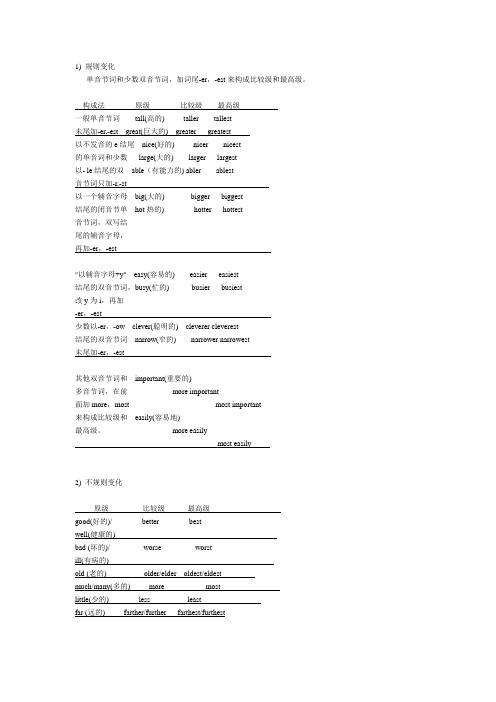
1) 规则变化单音节词和少数双音节词,加词尾-er,-est来构成比较级和最高级。
构成法原级比较级最高级一般单音节词tall(高的)taller tallest未尾加-er,-est great(巨大的)greater greatest以不发音的e结尾nice(好的)nicer nicest的单音词和少数large(大的)larger largest以- le结尾的双able(有能力的) abler ablest音节词只加-r,-st以一个辅音字母big(大的)bigger biggest结尾的闭音节单hot热的)hotter hottest音节词,双写结尾的辅音字母,再加-er,-est"以辅音字母+y"easy(容易的)easier easiest结尾的双音节词,busy(忙的)busier busiest改y为i,再加-er,-est少数以-er,-ow clever(聪明的)cleverer cleverest结尾的双音节词narrow(窄的)narrower narrowest未尾加-er,-est其他双音节词和important(重要的)多音节词,在前more important面加more,most most important来构成比较级和easily(容易地)最高级。
more easilymost easily2) 不规则变化原级比较级最高级good(好的)/better bestwell(健康的)bad (坏的)/worse worstill(有病的)old (老的)older/elder oldest/eldestmuch/many(多的)more mostlittle(少的)less leastfar (远的)farther/further farthest/furthest1)在否定句或疑问句中可用so…as。
He cannot run so/as fast as you.2)当as…as 中间有名词时采用以下格式。
英语比较级的含义

英语比较级的含义
英语比较级指的是对两个或多个事物进行比较时,用于表示其中一个事物相对于另一个事物的更高或更低程度的形式。
一般情况下,比较级在形容词、副词等词性的词前加-er构成,如taller (更高的)、faster (更快的)等。
在某些情况下,比较级可以通过在词前加more 或less来形成,如more beautiful (更美丽的)、less expensive (更便宜的)等。
比较级还可以用于表示数量上的比较,如more than (比……更多)、less than (比……更少)等。
在比较级的使用中,需要注意形容词和副词的词形变化规则,以及具体情境下的用法和搭配。
- 1 -。
英语中的比较级和最高级

英语中的比较级和最高级比较级和最高级是英语中用来对比两个或多个事物在特定品质或性质上的程度的语法结构。
在英语中,比较级和最高级分别用于形容词和副词的比较。
形容词的比较级和最高级比较级形容词的比较级用于比较两个事物在某种特定品质上的程度。
比较级的形式通常在形容词词尾加上 -er,或在前面加上 more。
例如:- old(年长的)→ older(更年长的)- beautiful(美丽的)→ more beautiful(更美丽的)最高级形容词的最高级用于比较三个或更多事物在某种特定品质上的程度,表示最高程度。
最高级的形式通常在形容词词尾加上 -est,或在前面加上 most。
例如:- old(年长的)→ oldest(最年长的)- beautiful(美丽的)→ most beautiful(最美丽的)副词的比较级和最高级比较级副词的比较级用于比较两个动作或状态在某种特定品质上的程度。
比较级的形式通常在副词词尾加上 -er,或在前面加上 more。
例如:- quickly(迅速地)→ more quickly(更迅速地)- slowly(慢慢地)→ slower(更慢慢地)最高级副词的最高级用于比较三个或更多动作或状态在某种特定品质上的程度,表示最高程度。
最高级的形式通常在副词词尾加上-est,或在前面加上 most。
例如:- quickly(迅速地)→ most quickly(最迅速地)- slowly(慢慢地)→ slowest(最慢慢地)以比较级和最高级来表达程度的变化在英语中非常常见,它们可以帮助我们更准确地描述事物之间的差异和特点。
在使用比较级和最高级时,需要注意形容词和副词的不规则变化形式,并且要根据上下文来判断使用哪种形式。
以上是关于英语中比较级和最高级的简要介绍。
英语比较级(comparativedegree)

比较级(comparative degree)在比较级中,有超越、相等、差逊三个级别。
1. 超越(superiority)(1)better than: 胜过,优于Doing is better than saying.(百说不如一做。
)(2)more than + 从句。
多余,超过She has talked more than what is necessary.(她说了一些多余的话)(3)“than +关系代词”的从句。
再…… 不过。
He is a scholar than whom no man ever will be more honest.(他是个再诚实不过的学者了。
)(4)superior to :占优势,比……胜一筹。
He is superior to his elder brother.(他比他哥哥强)2. 相等(equality)(1) as …as. 如……一样。
As busy as a bee. ( 忙得不可开交)(2) as well as 。
既…… 又,和……一样。
Pompey, as well as Caesar, was a g reat man.(像恺撒一样,庞培也是一位伟人。
)(3) the same as…. 像……一样。
The same as the past. (一如从前。
)像……一样。
(4) such/ so…as.Such a great poet as Homer was proficient not just in literature but also in history .(像荷马那样的诗人,不仅要精通文学,还要精通历史。
)(5) no sooner than.. 一……就(几乎同时,夸张用法)。
No sooner said than done.(说到做到。
)(6) No more than. 就像,不优于。
You’re no more capable of speaking French than I am.(你我都不会说日语。
英语比较级的用法总结
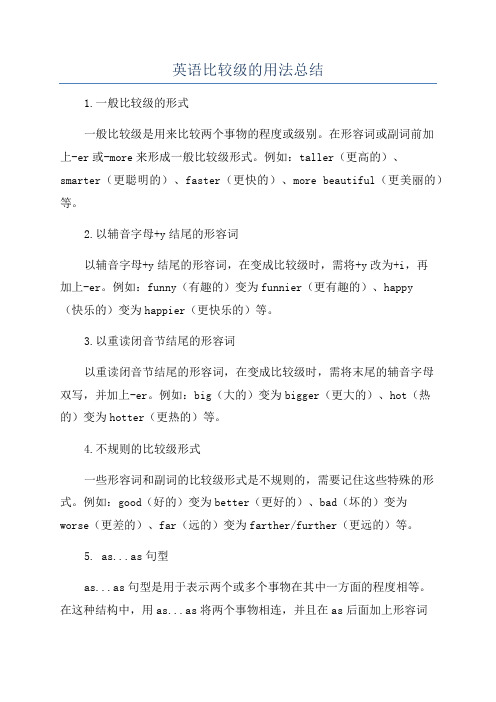
英语比较级的用法总结1.一般比较级的形式一般比较级是用来比较两个事物的程度或级别。
在形容词或副词前加上-er或-more来形成一般比较级形式。
例如:taller(更高的)、smarter(更聪明的)、faster(更快的)、more beautiful(更美丽的)等。
2.以辅音字母+y结尾的形容词以辅音字母+y结尾的形容词,在变成比较级时,需将+y改为+i,再加上-er。
例如:funny(有趣的)变为funnier(更有趣的)、happy(快乐的)变为happier(更快乐的)等。
3.以重读闭音节结尾的形容词以重读闭音节结尾的形容词,在变成比较级时,需将末尾的辅音字母双写,并加上-er。
例如:big(大的)变为bigger(更大的)、hot(热的)变为hotter(更热的)等。
4.不规则的比较级形式一些形容词和副词的比较级形式是不规则的,需要记住这些特殊的形式。
例如:good(好的)变为better(更好的)、bad(坏的)变为worse(更差的)、far(远的)变为farther/further(更远的)等。
5. as...as句型as...as句型是用于表示两个或多个事物在其中一方面的程度相等。
在这种结构中,用as...as将两个事物相连,并且在as后面加上形容词或副词的原级形式。
例如:She is as tall as her sister.(她和她妹妹一样高)6.比较级的用法比较级可以用来表达两个人或事物之间的差异或相似之处。
在句子中,比较级常常与than连用,表达一个事物在其中一方面比另一个事物更好或更差。
例如:He is taller than his brother.(他比他的兄弟更高)7.比较级的表示方法除了使用形容词或副词的比较级形式之外,还可以使用more或less加上形容词或副词的原级形式来表示比较级。
例如:He is more intelligent than his classmates.(他比他的同学更聪明)8.最高级的形式最高级是用来比较三个或三个以上人或物之间的级别或程度的形式。
英语单词中的比较级

没有比较级、最高级的形容词和副词英语中,有些形容词和副词没有比较等级,这主要是由于本身词义的缘故,在语义上不存在差别,这类词可称为不可分级形容词或副词。
主要有下列几类:1、本身就有比较级含义的词:senior年长的、较高的,junior年少的、较低的,prior在先的,anterior前面的,inferior次于、下等的,superior优于、上等的,posterior以后的,major主要的,minor次要的、较小的。
在使用这些词时无须加more,也不能和than连用,而要用介词to引出比较对象(这种表示法也称为拉丁比较级)。
例如:Thissocial system is super or than that system. 这种社会制度比那种优越。
He issenior to me by several years . 他比我大几岁。
Hismethod of doing reserach work is hardly appreciated ;he feels inferior toothers. 他做研究的方法没人欣赏;他感到比别人矮了一截。
2、表示状态或情况的词:afriad害怕的,asleep睡着的,alive活着的,alike相象的,awake醒着的,alone单独的,aware意识到的,ablaze着火的,adrift漂流的,afire燃烧着的,astray迷途,aghast惊呆的,ashamed羞耻的,alight照亮,astire 引动起来,afoot活动着的,ashore在岸上的,agape目瞪口呆,awerse不乐意的,afloat浮着。
3、表示形状的词;round圆形的,circular圆形的,oval椭圆形的,square方形的,oblong长方形的,angular角形的,level水平的,horizontal水平的。
4、表示物质特征的词;atomic原子的,solar太阳的,physical物理的,organic有机的,economic 经济的,sonic声音的,scientific科学的,wooden木制的,earthen泥土的,golden黄金般的,woolen羊毛的,bronze青铜的,silver银制的。
英语比较级和最高级的基本知识

英语比较级和最高级的基本知识比较级和最高级是英语中用于比较事物的形容词和副词的两个形式。
比较级用于将两个事物进行比较,而最高级用于将三个或更多事物进行比较。
掌握这些基本知识对于正确使用和理解英语的比较概念至关重要。
一、比较级1. 形容词和副词的构成:- 单音节和部分双音节词在词尾加上 "-er" 来构成比较级,同时需要在词前加上 "more" 作为限定,如 "taller"、"more beautiful"。
- 多音节词和部分双音节词在词前加上 "more" 来构成比较级,如 "more interesting"、"more intelligent"。
2. 比较级的用法:- 比较级用于两者之间进行比较,如 "This book is more interesting than that book."- 比较级通常在句子中放在比较的两个事物之间,用 "than" 连接,如 "She is taller than her brother."- 当比较的事物是同类事物时,比较级常用来表达更高的程度,如 "I am feeling better today."3. 特殊形式的比较级:- 对于部分词尾以 "e" 结尾的词,在词尾加上 "-r",如 "nicer"。
- 部分以 "y" 或 "er" 结尾的双音节词,在词尾加上 "-er",如"happier"。
- 部分单音节词以辅音字母结尾,要先双写该辅音字母再加上"-er",如 "bigger"。
英语比较级
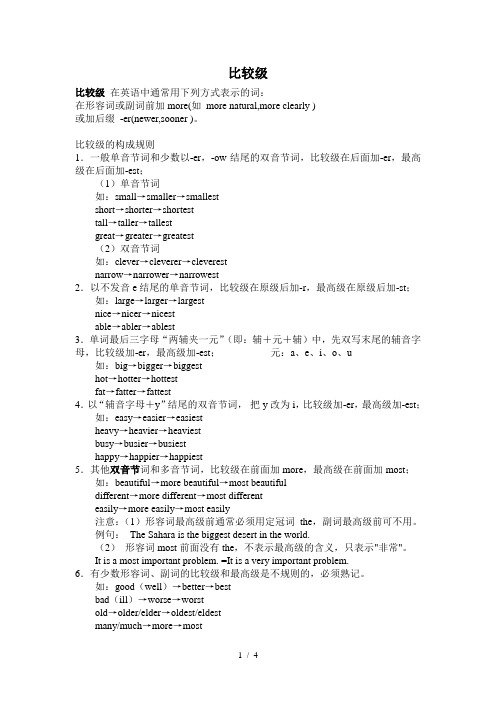
比较级比较级在英语中通常用下列方式表示的词:在形容词或副词前加more(如more natural,more clearly )或加后缀-er(newer,sooner )。
比较级的构成规则1.一般单音节词和少数以-er,-ow结尾的双音节词,比较级在后面加-er,最高级在后面加-est;(1)单音节词如:small→smaller→smallestshort→shorter→shortesttall→taller→tallestgreat→greater→greatest(2)双音节词如:clever→cleverer→cleverestnarrow→narrower→narrowest2.以不发音e结尾的单音节词,比较级在原级后加-r,最高级在原级后加-st;如:large→larger→largestnice→nicer→nicestable→abler→ablest3.单词最后三字母“两辅夹一元”(即:辅+元+辅)中,先双写末尾的辅音字母,比较级加-er,最高级加-est;元:a、e、i、o、u如:big→bigger→biggesthot→hotter→hottestfat→fatter→fattest4.以“辅音字母+y”结尾的双音节词,把y改为i,比较级加-er,最高级加-est;如:easy→easier→easiestheavy→heavier→heaviestbusy→busier→busiesthappy→happier→happiest5.其他双音节词和多音节词,比较级在前面加more,最高级在前面加most;如:beautiful→more beautiful→most beautifuldifferent→more different→most differenteasily→more easily→most easily注意:(1)形容词最高级前通常必须用定冠词the,副词最高级前可不用。
英语比较级

形容词的比较级和最高级。
(1)单音节词加词尾-er,-est来构成比较级和最高级。
tall(高的)taller tallest
(2)以不发音的e结尾去e 加-er,-est:
nice(好的);large(大的)
(3)以一个辅音字母结尾的闭音节单音节词,双写结尾的辅音字母:big;hot;red;thin;fat。
(4)以辅音字母+y"结尾的双音节词,改y为i,再加-er,-est:
easy(容易的)busy;happy;heavy;lazy;lucky;early;angry. (5)以ly结尾的副词,除-earlier-earliest,其他都是加more most. Slowly-more slowly-most slowly
(6)少数以-er,-ow结尾的双音节词未尾加-er,-est
clever(聪明的)narrow(窄的)
(7)其他双音节词和多音节词在前面加more,most。
如:important(重要的) more important most important
easily(容易地) more easily most easily
(8) 不规则变化
有一些词的比较级、最高级变化是不规则的,需要特殊记忆。
good / well→better→best bad / ill/badly→worse→worst
many / much→more→most little→less→least
far→farther→farthest(距离) / far→further→furthest (程度)
old→older / elder→oldest (新旧或年龄) / eldest (长幼关系)。
英语比较级语法

比较级:就是将二者进行比较产生的词形,是由形容词原级转化而来的。
一般是在原级后面加er,也有一些不规则的转化,比如good—better,bad—worse,有很多。
相对二者的比较,还有三者及以上的比较,这时就产生了最高级。
当我们需要对事物作出比较时,需要用到比较级,比如:He is younger than me.他比我年轻。
Pay Attention:比较的两者应该是互相对应的可比较的东西。
典型错误:My hair is longer than you.(我的头发比你更长。
)比较的两者是我的头发、你(整个人),那么比较的对象就没有可比性。
应该改为:My hair is longer than yours. 或My hair is longer than your hair.形容词的比较级是在形容词的基础上变化而来的,它的变化规则是:1. 一般的直接在词尾加er ,如 tall - taller , strong - stronger2. 以e结尾的,直接加r ,如 fine – finer3. 以辅音字母加y结尾的,先改y为i再加er,如funny - funnier4. 重读闭音节词词尾只有一个辅音字母,元音发短音时,双写最后的字母再加er,如big –bigger, thin–thinner, hot–hotter5. 多音节词和部分双音节词,在词前加“more”。
6. 由“动词+后缀-ing/-ed”构成的形容词,在词前加more构成比较级。
如:interesting-more interesting,bored-more bored。
7. 由“形容词+后缀-ly”构成的副词,在该副词前加more构成比较级。
如:slowly-more slowly,happily- more happily。
除此之外,还有几个特殊的单词,它的比较级是不规则的,如:many / much(原形)– more(比较级)little / few(原形)– less (比较级)good(原形)– better(比较级)bad (原形)– worse(比较级)far (原形)– further(比较级)比较级的句子结构通常是:什么 + 动词be (am , is , are ) + 形容词比较级 + than(比)+ 什么。
英语比较级和最高级
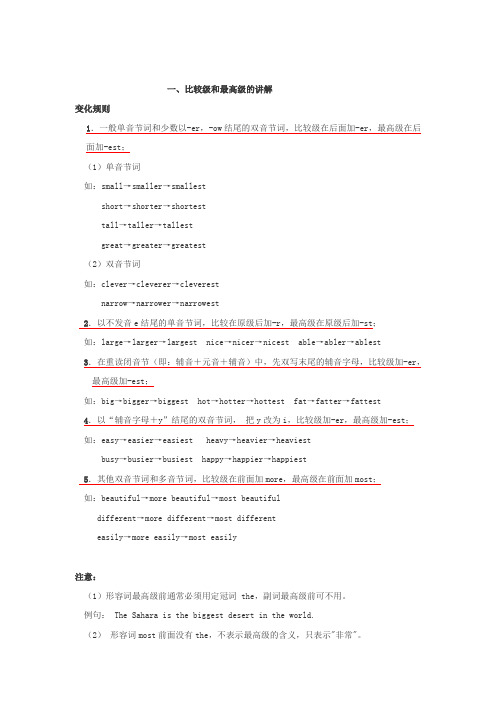
一、比较级和最高级的讲解变化规则1.一般单音节词和少数以-er,-ow结尾的双音节词,比较级在后面加-er,最高级在后面加-est;(1)单音节词如:small→smaller→smallestshort→shorter→shortesttall→taller→tallestgreat→greater→greatest(2)双音节词如:clever→cleverer→cleverestnarrow→narrower→narrowest2.以不发音e结尾的单音节词,比较在原级后加-r,最高级在原级后加-st;如:large→larger→largest nice→nicer→nicest able→abler→ablest3.在重读闭音节(即:辅音+元音+辅音)中,先双写末尾的辅音字母,比较级加-er,最高级加-est;如:big→bigger→biggest hot→hotter→hottest fat→fatter→fattest4.以“辅音字母+y”结尾的双音节词,把y改为i,比较级加-er,最高级加-est;如:easy→easier→easiest heavy→heavier→heaviestbusy→busier→busiest happy→happier→happiest5.其他双音节词和多音节词,比较级在前面加more,最高级在前面加most;如:beautiful→more beautiful→most beautifuldifferent→more different→most differenteasily→more easily→most easily注意:(1)形容词最高级前通常必须用定冠词 the,副词最高级前可不用。
例句: The Sahara is the biggest desert in the world.(2)形容词most前面没有the,不表示最高级的含义,只表示"非常"。
英语比较级变化规则
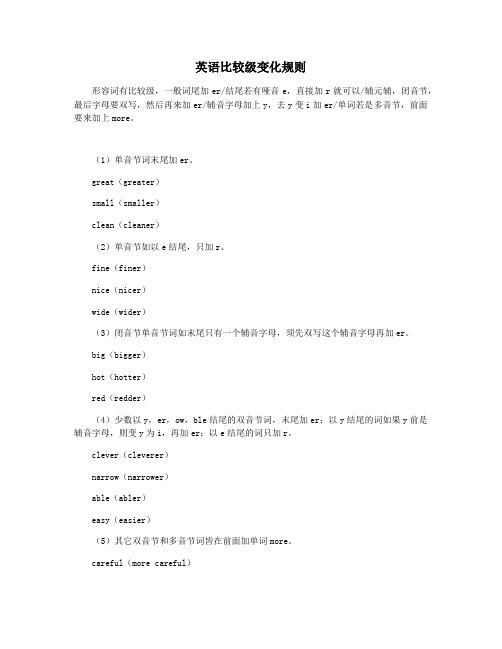
英语比较级变化规则
形容词有比较级,一般词尾加er/结尾若有哑音e,直接加r就可以/辅元辅,闭音节,最后字母要双写,然后再来加er/辅音字母加上y,去y变i加er/单词若是多音节,前面要来加上more。
(1)单音节词末尾加er。
great(greater)
small(smaller)
clean(cleaner)
(2)单音节如以e结尾,只加r。
fine(finer)
nice(nicer)
wide(wider)
(3)闭音节单音节词如末尾只有一个辅音字母,须先双写这个辅音字母再加er。
big(bigger)
hot(hotter)
red(redder)
(4)少数以y,er,ow,ble结尾的双音节词,末尾加er;以y结尾的词如果y前是辅音字母,则变y为i,再加er;以e结尾的词只加r。
clever(cleverer)
narrow(narrower)
able(abler)
easy(easier)
(5)其它双音节和多音节词皆在前面加单词more。
careful(more careful)
difficult(more difficult)
delicious(more delicious)
有些词的比较级变化不规则,则需要特殊记忆。
good/well(better)
bad(worse)
many/much(more)
little(less)
far(farther)
感谢您的阅读,祝您生活愉快。
(完整版)英语单词比较级
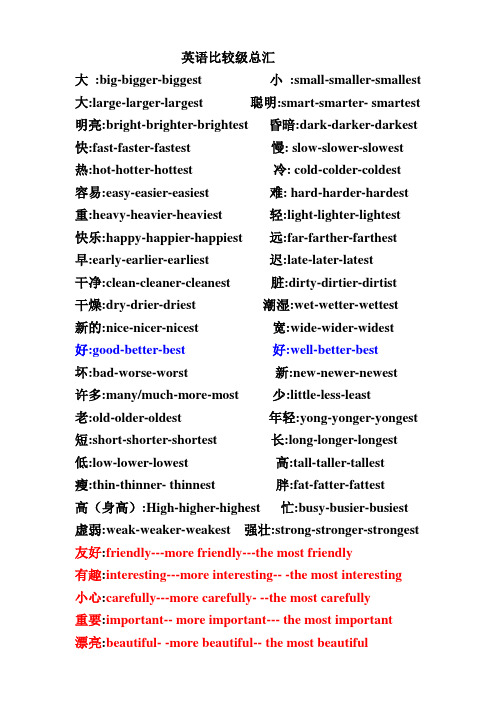
英语比较级总汇大:big-bigger-biggest 小:small-smaller-smallest 大:large-larger-largest 聪明:smart-smarter- smartest 明亮:bright-brighter-brightest 昏暗:dark-darker-darkest 快:fast-faster-fastest 慢: slow-slower-slowest 热:hot-hotter-hottest 冷: cold-colder-coldest容易:easy-easier-easiest 难: hard-harder-hardest 重:heavy-heavier-heaviest 轻:light-lighter-lightest快乐:happy-happier-happiest 远:far-farther-farthest 早:early-earlier-earliest 迟:late-later-latest干净:clean-cleaner-cleanest 脏:dirty-dirtier-dirtist干燥:dry-drier-driest 潮湿:wet-wetter-wettest新的:nice-nicer-nicest 宽:wide-wider-widest 好:good-better-best 好:well-better-best坏:bad-worse-worst 新:new-newer-newest许多:many/much-more-most 少:little-less-least老:old-older-oldest 年轻:yong-yonger-yongest 短:short-shorter-shortest 长:long-longer-longest 低:low-lower-lowest 高:tall-taller-tallest瘦:thin-thinner- thinnest 胖:fat-fatter-fattest高(身高):High-higher-highest 忙:busy-busier-busiest 虚弱:weak-weaker-weakest 强壮:strong-stronger-strongest 友好:friendly---more friendly---the most friendly有趣:interesting---more interesting-- -the most interesting小心:carefully---more carefully- --the most carefully重要:important-- more important--- the most important漂亮:beautiful- -more beautiful-- the most beautiful。
英语单词比较级
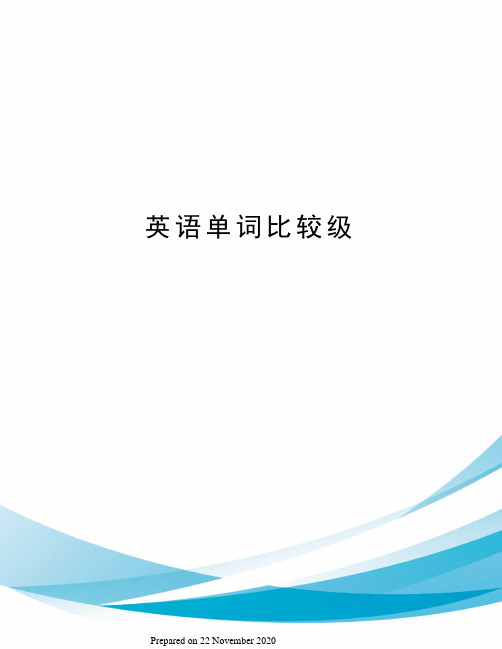
英语单词比较级英语比较级总汇大:big-bigger-biggest 小:small-smaller-smallest大:large-larger-largest 聪明:smart-smarter- smartest明亮:bright-brighter-brightest 昏暗:dark-darker-darkest 快:fast-faster-fastest 慢: slow-slower-slowest热:hot-hotter-hottest 冷: cold-colder-coldest容易:easy-easier-easiest 难: hard-harder-hardest重:heavy-heavier-heaviest 轻:light-lighter-lightest快乐:happy-happier-happiest 远:far-farther-farthest 早:early-earlier-earliest 迟:late-later-latest干净:clean-cleaner-cleanest 脏:dirty-dirtier-dirtist干燥:dry-drier-driest 潮湿:wet-wetter-wettest新的:nice-nicer-nicest 宽:wide-wider-widest 好:good-better-best 好:well-better-best坏:bad-worse-worst 新:new-newer-newest许多:many/much-more-most 少:little-less-least老:old-older-oldest 年轻:yong-yonger-yongest短:short-shorter-shortest 长:long-longer-longest低:low-lower-lowest 高:tall-taller-tallest瘦:thin-thinner- thinnest 胖:fat-fatter-fattest高(身高):High-higher-highest 忙:busy-busier-busiest虚弱:weak-weaker-weakest 强壮:strong-stronger-strongest 友好:friendly---more friendly---the most friendly有趣:interesting---more interesting-- -the most interesting 小心:carefully---more carefully- --the most carefully重要:important-- more important--- the most important漂亮:beautiful- -more beautiful-- the most beautiful。
英语单词的比较级和最高级
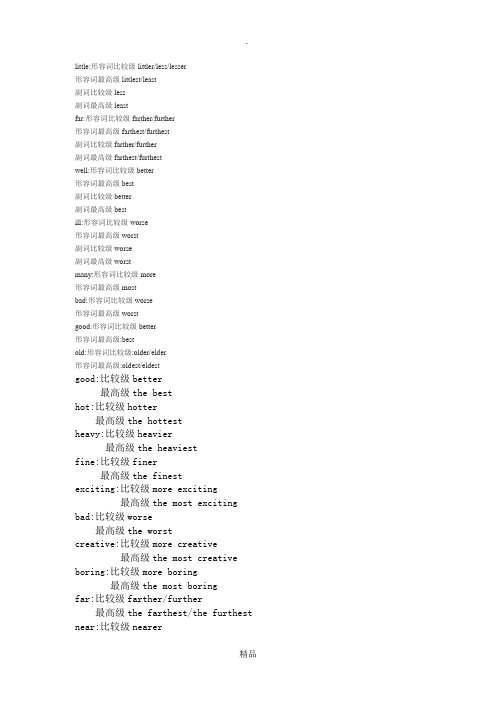
little:形容词比较级littler/less/lesser形容词最高级littlest/least副词比较级less副词最高级leastfar:形容词比较级farther/further形容词最高级farthest/furthest副词比较级farther/further副词最高级farthest/furthestwell:形容词比较级better形容词最高级best副词比较级better副词最高级bestill:形容词比较级worse形容词最高级worst副词比较级worse副词最高级worstmany:形容词比较级more形容词最高级mostbad:形容词比较级worse形容词最高级worstgood:形容词比较级better形容词最高级:bestold:形容词比较级:older/elder形容词最高级:oldest/eldestgood:比较级better最高级the besthot:比较级hotter最高级the hottestheavy:比较级heavier最高级the heaviestfine:比较级finer最高级the finestexciting:比较级more exciting最高级the most exciting bad:比较级worse最高级the worstcreative:比较级more creative最高级the most creative boring:比较级more boring最高级the most boringfar:比较级farther/further最高级the farthest/the furthest near:比较级nearer最高级the nearest如有侵权请联系告知删除,感谢你们的配合!。
- 1、下载文档前请自行甄别文档内容的完整性,平台不提供额外的编辑、内容补充、找答案等附加服务。
- 2、"仅部分预览"的文档,不可在线预览部分如存在完整性等问题,可反馈申请退款(可完整预览的文档不适用该条件!)。
- 3、如文档侵犯您的权益,请联系客服反馈,我们会尽快为您处理(人工客服工作时间:9:00-18:30)。
同级比较
1.as...as 和...一样 A+be/系+as+adj. +as Chinese is as important as Maths.
2.not as...as 不如 A+be/系+not+as+adj. +as
The desk is not as expensive as the computer. = The desk is cheaper(less expensive) than the computer.
* A + do(didn’t/ doesn’t/don’t do sth) as + adv + as B
比较级和最高级的形成
* 一般单音节词和少数以-er,-ow结尾的双音节词,比较级在后面加-er,最高级在后面加-est;
eg. small→smaller→smallest short→shorter→shortest
* 以不发音e结尾的单音节词,比较在原级后加-r,最高级在原级后加-st
→larger→largest nice→nicer→nicest able→abler→ablest
* 在重读闭音节(即:辅音+元音+辅音)中,先双写末尾的辅音字母,比较级加-er,最高级加-est;
eg. big→bigger→biggest hot→hotter→hottest fat→fatter→fattest
* 以“辅音字母+y”结尾的双音节词,把y改为i,比较级加-er,最高级加-est
eg. easy→easier→easiest heavy→heavier→heaviest busy→busier→busiest happy→happier→happiest
* 其他双音节词和多音节词,比较级在前面加more,最高级在前面加most;
eg. beautiful→more beautiful→most beautiful easily→more easily→most easily
* 有少数形容词、副词的比较级和最高级是不规则的
eg. good/well→better→best bad→worse→worst ill→worse→worst many/much→more→most
little→less→least far →further/farther→furthest/farthest
注意:(1)形容词最高级前通常必须用定冠词the,副词最高级前可不用。
The Sahara is the biggest desert in the world.
(2)形容词most前面没有the,不表示最高级的含义,只表示"非常"。
It is a most important problem. =It is a very important problem.
形容词比较级
* 形容词比较级句型:主语+动词+形容词比较级+than+比较对象
* 原型前+very/ too/ so/ quite 比较级前+much/ even/ get/ a little...
I feel much better now. I feel even worse.
* 只可同类比较 My house is bigger than yours (your house)
* 比较级and 比较级,越来越....
They are getting richer and richer. Our city is getting more and more beautiful. * of the two 用“the+比较级”表示两者中最...
It’s the cheaper of the two.
* the +比较级,the+比较级越...就越...
The more careful you are, the better you will be.
* 在比较级中,通常用that代替上文中提到的单数/不可数,复数用those
The water in this cup is less than that in that cup.
* Who/ Which is ....,A or B 用比较级
Who is slimmer, Marry or Millie?
形容词最高级
形容词最高级句型:主语+动词+the+形容词最高级+of+比较对象(in+比较范围)
* 用于三者及以上of the three / in our class
He is the tallest boy of the three / in our class.
* 最高级前+ the,副词前不加the
She is the best of the three. She sings best of the three.
* one of the + 最高级+ n. (复数)最...之一
She is one of my best friends.
* the+序数词+形容词最高级+n. (单数) ...是...的第几
The Yellow River is the second longest river in China.
* 比较级和最高级的转化
He is the tallest boy in his class. = He is taller than any other boy in his class. = He is
taller than all the other boys in his class.
* any 和any other
Yangtze River is longer than any other river in China.
Yangtze River is longer than any river in America.
副词比较级句型:动词+副词比较级+than+比较对象
副词最高级句型:动词+副词最高级+of+比较对象(in+比较范围)
比较事物的多少
两种数量的比较
* 比...多 more+ 可数/ 不可数 than I have more juice than him.
* 比...少 less + 不可数 than We drink less coffee than them.
fewer + 可数 than He has fewer friends than I.
三者及以上的比较
* 最多 the most + 可数/ 不可数 I have the most apples among the three of us. * 最少 the least+ 不可数 / the fewest +可数
Millie has the least juice. Millie has the fewest eggs.
翻译练习:
He drank less milk than I did.
Lucy spends more time learning English than Millie.
There’re more tomatoes in this box than in that box.
I have the most story books in our class.
I borrowed the fewest books from the library.
Who has the most money in the world.
He did the least work of all.。
